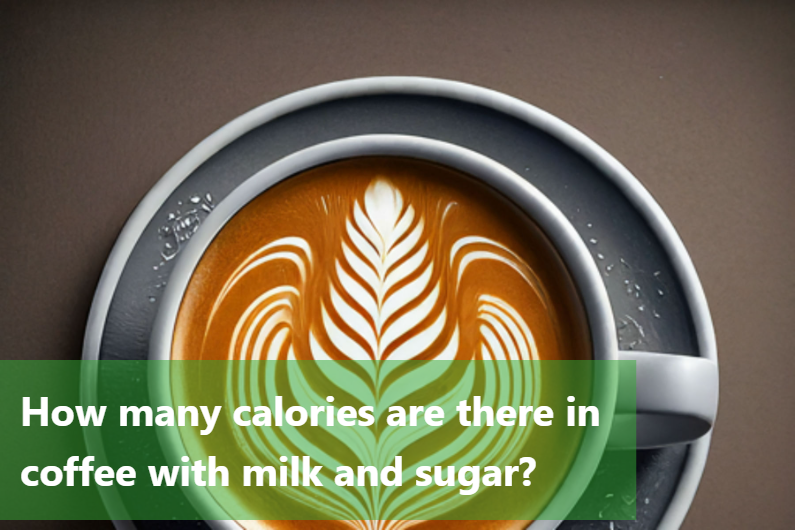
How many calories are there in coffee with milk and sugar?
As we go about our daily routines, the beverages we choose matter for our health goals. This especially applies to popular morning staples like creamy, sweet coffee drinks. Understanding the calorie content of these coffeehouse temptations can empower informed choices that serve our wellbeing.
When we consume calories, it impacts our energy balance and weight management aims. By illuminating the caloric values underlying various creative coffee preparations, we gain helpful context for thoughtful ordering and preparation. Education around coffee calories enables alignment with individual nutrition targets.
Through this discussion, we will explore calorie counts in coffee variations with added dairy and sweeteners. My aim is not to discourage enjoyment of the occasional indulgence, but rather emphasize awareness in beverage selection. Small, personalized adjustments accumulated over time can influence health. I hope to offer insights that empower you to make intentional choices that optimize for your needs.

Nutritional Profile
A serving of coffee with milk and sugar (per 240 ml or 8 oz cup) contains:
Nutrient |
Amount |
Calories |
57 kcal |
Carbohydrates |
9 g |
Sugars |
9 g |
Fat |
2 g |
Saturated Fat |
1.3 g |
Protein |
2 g |
Calcium |
61 mg |
Potassium |
116 mg |
Sodium |
44 mg |
Vitamin D |
0.6 mcg |
Exploring Coffee Varieties
Coffee Type |
Milk (Amount) |
Sugar (Amount) |
Total Calories (kcal) |
|---|---|---|---|
Latte |
1 cup (240 ml) |
1 tbsp (12.5 g) |
190 |
Cappuccino |
1/2 cup (120 ml) |
1 tbsp (12.5 g) |
90 |
Flat White |
2/3 cup (160 ml) |
1 tbsp (12.5 g) |
130 |
Macchiato |
1/4 cup (60 ml) |
1 tbsp (12.5 g) |
70 |
Mocha |
1/2 cup (120 ml) |
1 tbsp (12.5 g) |
170 |
Regular Coffee |
1/4 cup (60 ml) |
1 tbsp (12.5 g) |
57 |
Iced Coffee |
1/4 cup (60 ml) |
1 tbsp (12.5 g) |
57 |
Café au Lait |
1/2 cup (120 ml) |
1 tbsp (12.5 g) |
90 |
Irish Coffee |
1/4 cup (60 ml) |
1 tbsp (12.5 g) |
110 |
Health Benefits
Antioxidants: Coffee is rich in antioxidants, which help combat oxidative stress and may reduce the risk of chronic diseases.
Energy Boost: The caffeine in coffee provides a quick energy boost and improves mental alertness and concentration.
Nutrient Intake: Milk adds essential nutrients like calcium, vitamin D, and protein to the coffee, contributing to bone health and muscle function.
Mood Improvement: The combination of caffeine and sugar can enhance mood and provide a temporary sense of well-being.
Digestive Aid: Coffee can stimulate digestion and help with bowel regularity.
Metabolic Boost: Caffeine can temporarily boost metabolic rate and aid in fat burning.
Heart Health: Moderate coffee consumption is associated with a reduced risk of certain heart diseases.
Type 2 Diabetes: Some studies suggest that regular coffee consumption may lower the risk of developing type 2 diabetes.
Tips for Reducing Caloric Intake in Coffee with Milk and Sugar
If you're looking to reduce the caloric intake in your coffee without compromising on flavor, there are several simple and effective tips to consider.
One approach is to opt for low-calorie or sugar-free sweeteners as a replacement for sugar.
Additionally, using skim milk or plant-based milk alternatives can significantly lower the calorie content of your coffee.
Another strategy is to practice portion control by minimizing the amount of milk and sugar you add to your coffee.
Lastly, being mindful of how often you indulge in coffee with milk and sugar can also contribute to managing your overall daily calorie intake.
By implementing these strategies, you can savor your coffee while making conscious choices to reduce its caloric impact on your diet.

Calories in Coffee: Making Smart Choices for Health
It's important to pay attention to these differences, especially if you drink multiple cups in a day. Understanding how these extra calories can impact your daily intake is crucial. Although they may not seem significant, they can add up and affect your efforts to maintain a balanced diet. Being mindful of these factors can help you make informed choices that align with your health and wellness goals.
Being aware of the calorie content of our daily beverages, especially when we add extras to our coffee, can greatly impact our overall calorie intake. Whether it's the minimal calories in black coffee or the potential health effects of sugary additions, being thoughtful in our choices is essential. Utilizing different add-ins and moderating our intake can help reduce the calorie count in our coffee.
By making sensible decisions, we can still savor our favorite coffee without sabotaging our dietary objectives. It's about finding a healthy balance that suits each individual. Considering our coffee habits and their impact on our well-being is crucial. By making choices that account for calorie content, let's relish our coffee just the way we like it while ensuring we prioritize our health. Each person has a unique approach to managing their calorie intake while enjoying coffee. Remember, small adjustments can lead to significant progress in achieving a well-rounded lifestyle.
This Blog post is an initiative by Lo! Foods, to provide accurate and Nutritionist / Doctor approved information related to Health. Lo! Foods is India's leading brand for Everyday Functional Foods. Foods designed for specific Health conditions or Needs. Lo! Foods also runs India's largest range of Low Carb Healthy Cloud Kitchens, under the brand names of Lo!, ProteinChef, ATH (All Things Healthy) and DiabeSmart.















Leave a comment
Your email address will not be published.